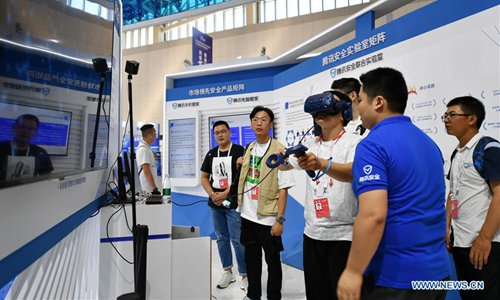Cybersecurity week kicks off in China

Photo taken on Sept 16, 2019 shows a view of the 2019 China Cybersecurity Week expo as part of a week-long national awareness campaign on cybersecurity in north China's Tianjin. First launched in 2014, the week-long campaign is an annual event that promotes national awareness on cybersecurity. Activities including the cybersecurity expo and a technology forum is held during this year's event. (Photo: Xinhua)
As the 2019 China Cybersecurity Week kicked off in Tianjin on Monday, Chinese experts called for enhanced measures to improve the country's own cyberspace management system so that it can be more resilient amid external threats from the global cyberspace community.
Chinese President Xi Jinping has highlighted the necessity for a cyberspace environment that is safe and manageable as well as open and innovative, the Xinhua News Agency reported Monday.
Efforts should be made to raise people's sense of fulfillment, happiness and security in cyberspace, Xi said in an instruction to the week-long national awareness campaign on cybersecurity that was launched in the coastal metropolis on Monday.
Without cybersecurity, there is no national security, Xi has reiterated on many occasions.
To China, the most urgent threats to cybersecurity lie in a US attack on China's networking infrastructure, the Western media's smearing of China's international image and a technology war against China, analysts noted.
The US, being the creator of the internet and initiator of major cyber attacks, has top-notch hacking technology and is launching an unprecedented cyber war against China and other countries, Qin An, head of the Beijing-based Institute of China Cyberspace Strategy, told the Global Times on Monday.
Different from previous cyberattacks, the cyber war has stepped from dark web to virtual life, which has seriously destroyed key infrastructure and affected people's lives, Qin said.
In March, Venezuela endured one of its worst blackouts and the government repeatedly claimed the widespread outage of power, phone and the internet was due to a cyberattack launched by the US, Forbes reported on March 9.
The US military carried out a secret cyber strike on Iran to prevent it from interfering with shipping in June, the Washington Post reported in August.
It was in retaliation for the shooting down of a US drone as well as attacks on oil tankers for which the US blamed Iran, the New York Times said.
In June, China's National Computer Network Emergency Response Technical Team warned that most cyberattacks against Chinese networks in 2018 came from the US.
A report released by the team said that in 2018, 14,000 servers in the US were infected by a Trojan virus or botnet to control 3.34 million host computers in China and the number of servers increased 90.8 percent year-on-year.
An ideological battle in cyberspace is also another challenge China is facing, Qin said.
Some Western media or social media platforms are trying to launch an ideological war in an attempt to defame the Chinese government and even subvert China's political system, he said.
Facebook suspended 10 Hong Kong police anti-violence WhatsApp hotlines on Friday, three days after the service's official launch, saying the app was "intended for private messaging only," the South China Morning Post reported.
In early August, Twitter suspended 936 accounts for "undermining the legitimacy and political positions" of the ongoing protests in Hong Kong.
Users said the suspension targeted accounts that expressed support for Hong Kong police while those spreading fake news about the ongoing unrest in Hong Kong such as smearing Hong Kong police's legitimacy of law enforcement were rarely touched.
Western social media platforms have gradually become core battlefields to disturb the social order in Hong Kong, Shen Yi, head of Fudan University's Cyberspace Governance Research Institute in Shanghai, told the Global Times on Monday.
"These platforms and media consciously acted as a 'support team' for the Hong Kong rioters, which not only damages the region's security and prosperity, but also threatens China's national security," Shen said.
"A company that threatens any country's national security by abusing its monopoly of social media will be treated as an unreliable entity," Shen said. "Effective punishment should be taken against such a company until it changes behaviors."

A visitor tries an exhibit at the 2019 China Cybersecurity Week expo as part of a week-long national awareness campaign on cybersecurity in north China's Tianjin, Sept. 16, 2019. First launched in 2014, the week-long campaign is an annual event that promotes national awareness on cybersecurity. Activities including the cybersecurity expo and a technology forum is held during this year's event.(Photo: Xinhua)
Completing system
First launched in 2014, the week-long annual event promotes cybersecurity awareness. Activities include a cybersecurity expo and a technology forum.
In the face of these threats, China has been accelerating the establishment of its own cyberspace, including laws and domestic products, as well as enhancing its network ownership, according to Chinese mainland analysts.
In June, China created six mirror copies of root name servers, a critical part of the internet infrastructure that helps users connect to the internet and a move that the analysts said would offer the country more backups in an internet breakdown led by the US.
China has also been building a multi-dimensional legal system with laws and regulations formulated to strengthen cybersecurity protection.
In June 2017, the country implemented the Cybersecurity Law. The Standing Committee of the 13th National People's Congress has placed the Law of Personal Information Protection in their legislative framework.
China has also issued the Provisions on the Protection of Children's Personal Information Online and finished soliciting public opinion on Measures for Data Security Management and the Measures on Security Assessment of the Cross-Border Transfer of Personal Information.
The prosperity of technology giants such as Huawei and ZTE has made the US feel its cyberspace hegemony is increasingly challenged by China, Qin said.
For this reason, the US constantly accuses Chinese companies of spying or leaving "back doors" to the Chinese government, he said.
The US-launched trade war to some extent is a technology war aimed at containing China's technology development, Qin noted.
Chinese Foreign Ministry spokesperson Hua Chunying slammed the US for hyping the Huawei 5G threat without evidence at a routine press conference on Monday in response to US officials lobbying Gulf states to stay away from Huawei.
The international community should work jointly to safeguard the security of information products and services under the premise of fairness and non-discrimination, Hua said.
Newspaper headline: Cybersecurity week kicks off